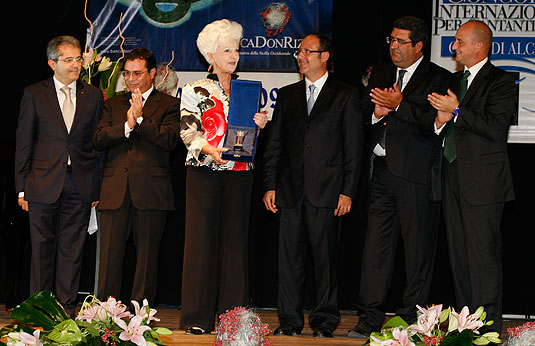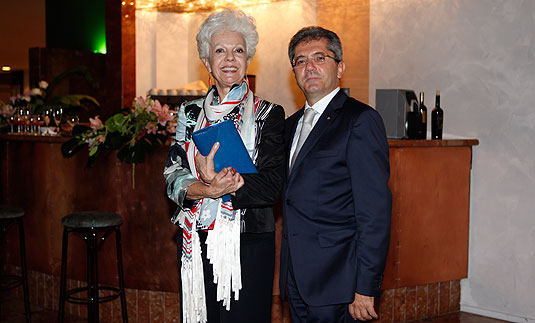Raina Kabaivanska An artist whose scenic expression becomes a lively and emotional musical gesture Raina Kabaivanska was born in Burgàss, a Bulgarian town on the shores of the Black Sea, from an upper-middle class family who was living in Sofia, where she studied as long as she obtained a University degree in Slavic Literature. She followed piano and singing classes at the Music Conservatory, coming to the fore from the very first concerts. In 1958 she won a scholarship for improving her opera singing skills, which she managed to attend and complete in Italy. When she was participating in the Viotti Contest, she met soprano singer Zita Fumagalli Riva to later become her affectionate private student. Her debut was in 1959 in the city of Vercelli, obtaining an immediate success in the role of Giorgetta in Puccini’s Il tabarro. Although she had already undertaken several contracts with different theatres, in 1960 she won the selection for being admitted to the Singing School of the Scala Theatre, on whose stage she was to perform as early as in 1961 in the role of Agnese in Bellini’s Beatrice di Tenda, side by side with the protagonist, Joan Sutherland – whom she even replaced on one occasion during the season. That marked the beginning of an international career that brought her to interpret top-level roles covering a very wide and versatile repertoire, ranging from the 18th to the 20th century (although she obliged herself to accept only the roles that she felt fit to her potential), which allowed her to appear on the most renowned stages, even if she never declined performing in “minor” theatres, due to her belief that the audience of small theatres does not differ from that of the biggest ones. She always had a particular and long-standing relation with the Scala Theatre of Milan and the Metropolitan Theatre of New York, where she worked with the most famous opera singers of the last decades, constantly being crowned with warm public success and critics’ appreciation. Her pressing professional engagements did not prevent her from keeping studying, to the extent that she went to Baltimore to become a student of mythical soprano Rosa Ponselle’s with whom she intended to improve her knowledge of some roles, including Cio Cio San of Puccini’s Madama Butterfly, a character for which Raina Kabaivanska is considered a model to imitate – the same that applies to Tosca e Manon Lescaut. Actually, she has been defined the “Puccinian Voice” par excellence. However this definition should not diminish her versatile skills. In fact, her long career has also been crowned with true triumphs to the present day, becoming for the audience the reincarnation of several other characters, such as Cilea’s Adriana Lecouvreur, Zandonai’s Francesca da Rimini, and Emilia Marty in Janacek’s Macropulos Case. Furthermore, she was the protagonist of many events on the occasion of opera seasons’ inaugurations and celebrations for theatres’ re-openings. She dedicated herself to chamber music, with particular regard but not limited to Slavic chamber music. She received many important rewards, and now teaches at Chigiana Music Academy of Siena and at the Music Academy of Osimo, as well as in several Master Classes at various institutions. In 1992, while she was at the height of her glory, she founded – together with poetess Dimitrova – a Charity Foundation named after her, whose mission is to give Bulgarian orphans both material support and an opportunity to receive an artistic education that may allow them to find a dignified job. Thanks to her singing and acting skills, as well as to her versatility (although she was defined “the last great tragédienne of modern opera”, whose irresistible verve is evident in Lehar’s La Vedova allegra), class, style, elegance, and technique allowed her to express a perfect symbiosis between her singing and the scenic result regardless of the role she was playing. She always masterfully donated her voice to the character she was interpreting, with faithful consistency between stage performance and musical substance, through a thorough artistic taste that burst out from her inner emotional power to produce a glowing outcome. As she likes to say, “in Opera, everything rises from the Music, scenic actions should be expressed through it, and everything must return back to the Music”. Reasons for assigning the Award For the vibrating emotions that she infused into all the characters she interpreted, thus conveying to the audience the innermost throbs and secrets of the characters’ souls, thanks to a great artistic and professional sensitivity typical of the greatest artists, for having demonstrated that opera does not have geographic borders but it rather responds only to the artist’s compliance with his/her role, for having entirely donated herself to the audience in each performance, without discriminating between famous and minor theatres, for the passion, commitment and discipline that have characterized all her long and eclectic artistic life, for her intense social engagement in support of the young and unfortunate people, which drove her to create opportunities for them to acquire and express artistic knowledge, for all these reasons, the 2009 Edition of the “Vissi d’Arte - Città di Alcamo” Award is assigned to soprano Raina Kabaivanska.
Consegna Premio Internazionale per la Cultura a Raina Kabaivanska – soprano
|

Per informazioni: Associazione “Amici della Musica”
Via F.lli S. Anna, 77 - 91011 Alcamo (TP) -Tel. +39 0924 505744 - Fax +39 0924 1916611 - Cell. +39 335 7073611
VoIP “Skype”: amicidellamusicaalcamo
info@amicimusicaalcamo.it
Partita Iva 01374350815






